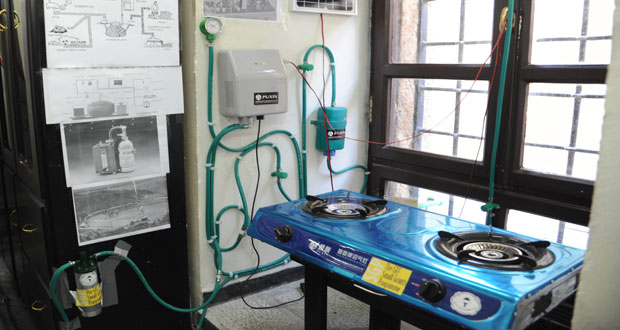DAMASCUS, (ST)- Director of the North -Eastern Area Project in the Ministry of Agriculture, Dr. Yasser Salameh revealed that direct investment of the 100 biogas units that were imported recently will be operated within a few days only. The first experiment will be performed in one of the villages of the project in the province of Damascus.
of the 100 biogas units that were imported recently will be operated within a few days only. The first experiment will be performed in one of the villages of the project in the province of Damascus.
“The bio-gas units have been distributed, in accordance with rules and standards set by the management of the project, on agricultural guidance units and breeders of sheep and poultry under the direct supervision of the working team, which includes 12 engineers and technicians. The working group will supervise on how to install, operate and maintenance of these units that have been imported with a view to the service of the rural community and enable those people of using these sophisticated new technologies and contribute to the improvement of living, economic and social conditions of the citizens and to involve them in the comprehensive development process and optimum investment of natural and human resources in their areas, Dr. Salameh told local press.
of natural and human resources in their areas, Dr. Salameh told local press.
The Ministry of Agriculture and the management of the project worked to expand the map of the two projects and move toward new areas along with the northeastern region villages including al –Hassaka and Deir ez -Zour, referring to the aim of the biogas project of animal waste in 100 targeted villages for the production of alternative energy and products of fermentation; taking into account the environmental dimension to achieve the principle of sustainable development and contribute to the improvement of living, economic and social conditions for members of the rural community in the region, noting that the share of al -Hassaka of hardware reached 55 devices, Dr. Salameh pointed out.
“The Ministries of Agriculture and Environment moved towards the north-eastern region is a complete plan of support provided to the people of rural families in these areas by encouraging them and helping them to find alternatives that will develop this region through the deployment of many of the programs and projects, including biogas production from animal waste, and to maintain the sustainability of agricultural resources and the animal and agricultural integration and the use of the waste to secure the household needs of biogas through this project, which is one of the most important projects to save energy,” Dr. Salameh added.
“The organic waste of plants and animals of great value in the age of technology, industry and clean energy, where the organic waste has become increasingly valuable in alternative energy fields and used as a source of power generation, meets the basic requirements of energy and provides well organic fertilizer to raise agricultural productivity,” Dr. Salameh concluded.
Sharif. Al -Khatib

